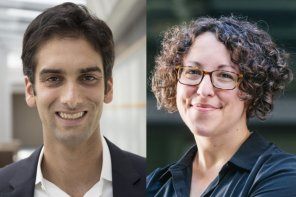Neale Mahoney and Heidi Williams named co-recipients of the biennial award from the American Society of Health Economists.
Two faculty from the Department of Economics in the School of Humanities and Sciences have been named co-recipients of the biennial 2021 ASHEcon Medal — an award from the American Society of Health Economists for researchers aged 40 and under who have made significant contributions to the field of health economics.
Neale Mahoney, Professor of Economics and the George P. Shultz Fellow at the Stanford Institute for Economic Policy Research (SIEPR), and Heidi Williams, the Charles R. Schwab Professor of Economics and Senior Fellow at SIEPR, share this year’s medal, which was awarded at a ceremony during the virtual ASHEcon conference on June 21.
“Neale Mahoney and Heidi Williams have both made fundamental contributions to our understanding of economic policy,” said B. Douglas Bernheim, the Trione Chair of the Department of Economics, and the Edward Ames Edmonds Professor. “Both have emerged as world leaders among the economists of their generation who conduct empirical studies of microeconomic policy.”
Williams and Mahoney joined the Stanford faculty in 2019 and 2020 (respectively). Prior to this, Williams was visiting faculty at SIEPR in 2013 and 2018, and Mahoney received his doctorate and master’s in economics from Stanford.
Williams' dissertation research garnered national attention. She investigated whether intellectual property rights, such as patents, had an effect on subsequent scientific research and product development in the context of the race to sequence the human genome between the publicly funded Human Genome Project and the private company Celera. Williams’ evidence suggested that Celera’s intellectual property rights slowed subsequent research and development by 20 to 30 percent.
Williams’ subsequent research builds on this work with a focus on health care markets.
“There is widespread consensus that medical innovation has been a key driver of both health care cost growth and improvements in health outcomes,” said Williams. “I came to work in the field of health economics because I wanted to understand whether we are getting the ‘right’ medical technologies developed from society’s perspective and whether changes in public policies could generate meaningful benefits for society.”
Mahoney traces his interest in financial distress and the U.S. health care system to his graduate school days at Stanford. One of Mahoney’s current research interests concerns the challenges of sustaining high-quality health care. “How do you pay doctors and hospitals in ways that encourage the provision of valuable care that improves patient health and discourages low-value care that has limited or even detrimental health effects and wastes taxpayer money?” he said.
Mahoney is also conducting a randomized experiment that uses donor funds to buy and forgive the debt of a randomly selected sample of individuals. “The goal is to both measure the toll of medical debt and to learn about the types of households that benefit the most from debt forgiveness so we can use limited donor funds in the most effective manner,” Mahoney explained.
Williams and Mahoney are “tremendous teachers and mentors, and in those roles are making critical contributions to our department's educational mission,” said Bernheim.
“It's an honor to share an award with my colleague and to follow in the footsteps of previous award winners,” said Mahoney. Williams praised her collaborators, mentors, and colleagues. “I am very grateful to a lot of people,” she said, adding: “Stanford’s support has really expanded the horizons of how I think about trying to solve problems.”




